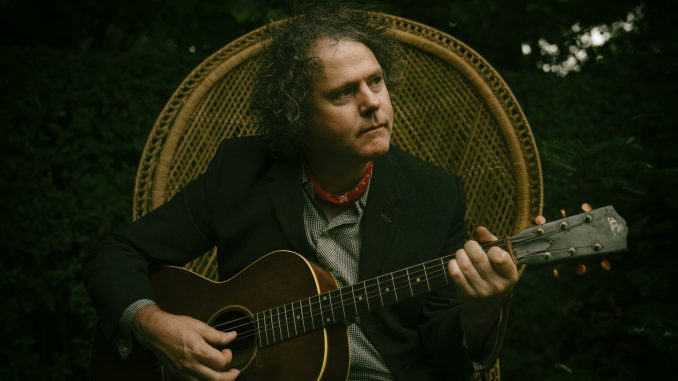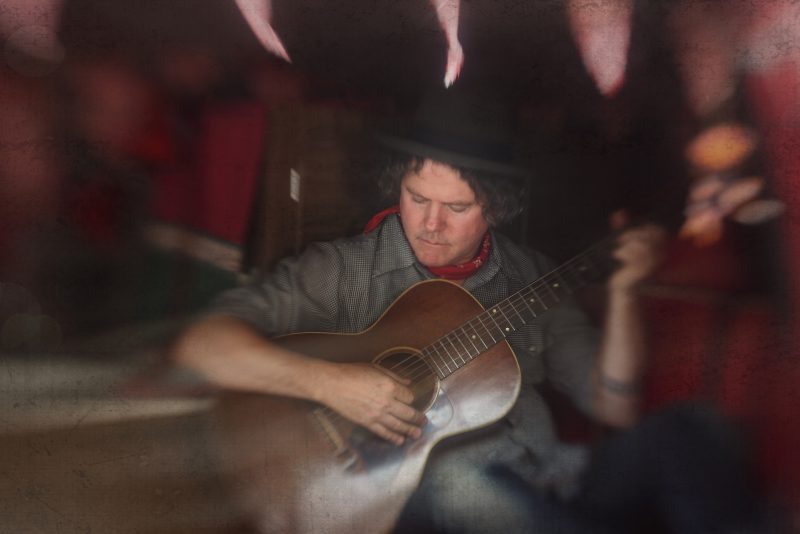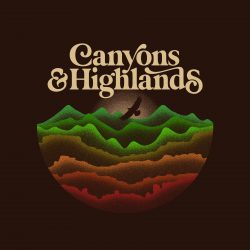
Canyons & Highlands delves into vintage correspondence with a fine mix of classic folk and country sounds.
‘Canyons & Highlands’ is the fifth full-length album from Scottish singer/songwriter Norrie McCulloch. Unlike its predecessors, it’s not being released as a McCulloch album with the Canyons & Highlands title acting as the name for the project. As with many other recent releases it was recorded during lockdown, necessitating remote recording across the Atlantic as McCulloch’s basic tracks were added to by musical friends from Scotland and America (Teenage Fanclub multi-instrumentalist Dave McGowan, guitarists Iain Thomson and Marco Rea, Lavinia Blackwall (Trembling Bells, Wyndow), fiddler Christian Sedelmyer and Stuart Kidd and Nicholas Falk on drums). The album is a delightful collection of decidedly laid-back songs which evoke classic American and UK songwriters with echoes of Laurel Canyon, Greenwich Village and Soho all in the mix along with McCulloch’s unmistakable Scottish voice. Americana UK spoke to McCulloch on the eve of the album’s release, and we started by asking him about the recording process.
I already had the songs written when lockdown started, and I thought that this would give me all the time I needed to record the basic tracks at home as I had all the gear I needed. But although everyone remembers lockdown as being pretty quiet, it was actually really noisy with people working in their gardens, building man sheds, walking their dogs and such. I’d be recording a song when someone would fire up a lawn mower or start hammering a fence post and you could hear it over my voice. So, I couldn’t record during the day and my partner, who works in the NHS, was knackered when she got home so I couldn’t do it in the evening. But then I just thought, why don’t I do it in my campervan? It was in the driveway, it’s well insulated and I could put my equipment in there and run a cable into the house for power. I asked some of my neighbours if they could hear me playing in the van and they couldn’t so that’s where I laid down my basic tracks for the songs. Once I had the basic tracks down, I then sent them to Marco and Iain and the others, and they added their parts.
When I sent the songs to the others, I deliberately didn’t give them any directions at all as to what they should do with them or what they should play. It’s as if I had given then a picture, a landscape of something and then they painted in the foreground, adding a river or a boat or a house or anything they wanted. A great example is the first song on the album, ‘Pushing On/Wolves’, which I sent off to Marco Rea and his partner Lavinia. They’re both great singers and I did feel that I wanted some other voices on it so I asked Marco if they could add vocals but otherwise, he could do what he wanted with it and what you hear is exactly what he sent back. Marco likes The Allman Brothers and he and Iain added a short twin guitar part at the end which brilliantly closes the song. I love it but it had nothing to do with me at all. That’s really what excited me about the songs, the way the guys transformed them. I wasn’t going to tell these brilliant musicians, much, much better than me, how to play their guitars or bass or whatever. I mean, if you listen to my albums, I think that I’m always the weakest link, the one who is about to fall apart. The musicians are the ones who really make the songs. I’ve worked with Dave and Iain and Marco for a long time so they have a good idea of how I work and what I want, and they can nail it every time. I know what’s in their record collections, we have a WhatsApp group where we talk about records we’ve discovered, old soul singers, weird 70s folk psychedelic guitar solos and the like, so we’re all really in tune with each other. So, I might have an idea of how I want a song to sound but I don’t really need to tell them as they’re probably going to think along similar lines. I feel that if I had said, for example, I want this to sound like something off ‘Astral Weeks’, then they’re not going to give you themselves, instead they’re going to give you their interpretation of what they think Van Morrison would want on ‘Astral Weeks’.
Looking back on the process, the recording went much more smoothly than I imagined but actually getting the album out has been really tough. There are huge waits for manufacturing anything and all the prices have shot up. They’ve pretty much doubled. Eventually I found it was cheaper to have the album pressed in the Netherlands and pay import taxes to have them sent here and it was faster also. I’ve only been able to afford to do this due to funding I was lucky enough to get some funding from Creative Scotland.

I believe that several of the songs on the album are based on old letters and postcards you have collected over the years.
I had been up in my attic and found a box of letters and postcards and was going through them. There was a bunch of letters my mother had sent me when I was in Canada in my twenties and reading them brought back some great memories. Tied to this there was also a series of letters from a friend I had at that time, a girl called Kat who I had met in Glasgow when she was travelling around the world and when she went back to Canada we kept in touch. Three of the songs were inspired by and actually used some of the words from letters she had sent to me. Reading the letters, I thought there were actually whole passages I could use in a song. On ‘Another Side Of The World’ each verse is just verbatim what she wrote in the letter although I’ve tried to arrange them into a song structure. In her letter she writes, “I wrote you these words the other day but here I am writing them again,” and that’s because she had started a letter and then changed her mind and started again. I was reading this, and I just felt that this could be the opening lines to a song, and it worked out really well so, I managed to write another two other songs, again using her words. ‘Down From The Mountain’ is based on her telling me about a winter job she had in the Canadian Rockies where she was part of a team trying to keep bears out of the local town taking food from bins. I didn’t use that part in the song, but I took some of her words when she wrote, “There’s been a thunder and lightning storm every night since I came back down from the mountain” and that became the chorus for the song. There were lots of passages in the letters which I just felt could be used, I saw them as a kind of patchwork, and I joined them together to make the songs. They might not actually tell a story, but the words just seemed to fit together once I had found a place for them. I always feel that it’s the words and how they sound within a song which is important rather than just telling a story, that way the song is much more intriguing. It’s like Guy Clark who used to talk about the spaces within a song which allow you to use your imagination, rather than just a straightforward story.
As for the postcards, I had started buying old postcards in charity and junk shops, just because I liked the pictures on them. And then when I was looking through the old letters there was a pile of the postcards in there also and I started to read the messages on them and started to wonder about the people who had written them, probably all dead by now, so I was reading them and again a song like ‘Took It To Heart’ was inspired by a postcard where someone had written “I don’t know what happened to him but I think he took it to heart” and I built a song around it, ‘Hurry Up Angel’ was another one where I stole some words from an old postcard. I mean some of them are from the 1920s and I was wondering about who wrote these and why were they saying what they were saying, I got really intrigued by it all. I really miss the art of letter and postcard writing. I can’t remember the last time I got a letter which wasn’t a bill or something, but I still write letters to people.
The album is being released as by Canyons & Highlands as opposed to a Norrie McCulloch album. Is this to impress on people the transatlantic connections in the recording process?
That’s part of it. For some reason I didn’t want to have this coming out under my name, and I was trying to think of a name for the project and the idea of having two sets of musicians from America and Scotland gave me the idea of trying to join up the two countries in the title. I was thinking of opposites- hot and cold and stuff like that – but then I thought that most folk, when they think of Scotland, they think of the highlands and I realised that in America the opposite might be canyons and when I put them together, they just seemed to sound right, you can pronounce them almost in the same way. The idea of recording under a project name goes back to when I released some early things under the name Fireside Sessions. My first album ‘Old Lovers Junkyard’ was going to be a Fireside Sessions album but then it turned out that Brent Cobb had a popular online series with the same name, and I couldn’t compete with him, so I released it under my own name. But I’ve always liked solo singers who can record under different names, Bill Callahan and such, and I just felt that these songs deserved to go out under a project name rather than as another Norrie McCulloch album.

I see that in the Publicity material you say that the album can be filed under a genre you call Astral Folk.
That’s a wee bit tongue in cheek, like a private joke. When ‘These Mountain Blues’ came out one reviewer gave it a poor review and said this is not blues music. He just didn’t get it. It’s not supposed to be a blues album. I was thinking of Townes Van Zandt who used the word blues a lot of the time in his songs. He said that there were only two types of music, the blues and Zip-A-Dee-Doo-Dah, and that’s where I was coming from, especially as I had written the title song at Townes’ graveside. So, when that guy said this isn’t blues music I had to laugh, some folk just don’t friggin’ get it. Anyhow, when I was asked for the PR blurb to categorise the album it got me to thinking. Maybe a lot of people might consider it country folk, but I don’t really think that’s right, and I don’t really feel it’s Americana, that’s a term I don’t really like, for me that’s guys singing in an American accent and not really singing about where they come from. I’d say that a song like ‘She Just Doesn’t Live Here Anymore’ is a country song with a bit of a twist in it but most of the music on the album is more like folk but it’s not traditional folk. I thought that some of the songs, to me at least, have a slight Tim Buckley, Fred Neil vibe to them while I was also really into an infamous lost album by Ted Lucas, a guy who worked for Motown and who released one brilliant album in the seventies before disappearing. I remembered someone calling it Astral Folk and that’s the feeling I was going for. The Astral bit might remind folk of early Van Morrison but then that’s not a bad thing. I mean, listen to Van on ‘Ballerina’ or ‘The Way Young Lovers Do’, or say, Tim Buckley singing ‘Buzzing Fly’, that’s not folk music, there’s a bit of a sparkle, something mystic about it. That’s my idea of Astral Folk and I think that on ‘Canyons & Highlands’ I’ve captured some of that vibe.


